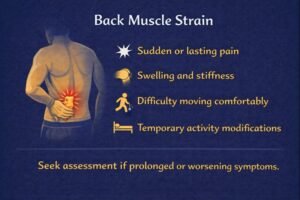Back Muscle Strain: Awareness, Symptoms & Activity Considerations
A back muscle strain happens when muscles or tendons in the back are overstretched or irritated. Strains commonly affect the lower back and can temporarily interfere with work, school, sports, and daily activities. Most cases are mild to moderate, but some can cause prolonged discomfort or mobility limitations.
Relevance in Workplaces, Sports & Canadian Context
Back strains occur in physically active jobs (lifting, bending, twisting), desk work with prolonged sitting, recreational sports, and everyday activities like gardening or home projects. Awareness of strains helps individuals recognize symptoms early, modify activity, and seek assessment when needed.
Scenario: Mild & Realistic
A warehouse worker lifted several boxes during a busy shift and later noticed tightness in the lower back with mild pain while bending. They reduced lifting that week and arranged a physiotherapy assessment, which confirmed a mild strain. The discomfort improved with gradual activity and movement guidance.
Common Causes of Back Strain
-
Sudden heavy lifting or awkward carrying
-
Repetitive bending or twisting
-
Falls or collisions
-
Sports activities (especially explosive movements)
-
Poor posture or prolonged sitting
-
Limited flexibility or muscle fatigue
-
Sudden increases in physical activity
Possible Symptoms (Awareness Only)
Symptoms vary depending on severity:
Mild Strain
-
Tightness or stiffness
-
Mild discomfort during movement
-
Minimal swelling
-
Normal walking ability
Moderate Strain
-
Increased pain or spasms with movement
-
Local tenderness and swelling
-
Difficulty bending, twisting, or walking comfortably
Severe Strain
-
Sharp or persistent pain after injury
-
Reduced mobility and difficulty walking
-
Swelling or prolonged activity limitation
-
Longer recovery period
Symptoms can overlap with other back issues, so healthcare evaluation may be recommended if symptoms persist.
Activity Considerations & Recovery Awareness
Healthcare and rehabilitation professionals may discuss:
-
Short-term activity modification
-
Graded movement or exercise
-
Posture and ergonomics
-
Strength and flexibility programs
-
Workplace or sports modifications
Prolonged bed rest is generally discouraged by modern rehab guidelines, as it may slow recovery and reduce muscle conditioning.
When to Seek Medical or Rehab Assessment
Assessment may be helpful when:
-
Pain persists longer than expected
-
Symptoms interfere with daily tasks, work, or sports
-
Numbness, tingling, or weakness develops
-
The injury stems from a fall, collision, or heavy impact
-
There is a history of recurring back pain
-
Walking becomes difficult or limited
-
Symptoms spread into the legs
Healthcare professionals may recommend physiotherapy, imaging (if appropriate), or other supportive care approaches.
Workplace & Sport Prevention Strategies
Prevention efforts may include:
-
Safe lifting techniques & team lifts
-
Regular movement breaks during long sitting periods
-
Strength and conditioning for core + hips
-
Warm-up before sports or demanding tasks
-
Ergonomic setups for desk jobs
-
Gradual load progression in training
FAQ
1. Do back strains heal on their own?
Many mild strains improve over time, especially with modified activity. Persistent symptoms should be evaluated.
2. Are back strains the same as disc injuries?
No. They involve different structures, though symptoms can overlap. Only healthcare assessment can distinguish them.
3. Should people rest completely?
Short-term rest may help early discomfort, but prolonged inactivity can slow recovery. Professionals guide activity levels.
4. Why do athletes get back strains?
Explosive movements, fatigue, and core imbalances can overload the muscles.
5. Can work tasks contribute?
Yes. Repetitive lifting or prolonged sitting can increase strain risk without proper ergonomics or breaks.
Educational Note
This article provides public education about back muscle strains, symptom awareness, and prevention. It does not diagnose, prescribe treatment, or recommend specific medications. Healthcare and rehabilitation professionals determine appropriate care and return-to-activity plans.

